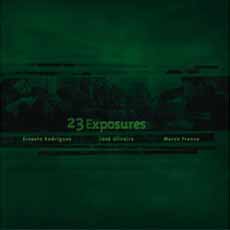
23 exposures
Ernesto Rodrigues | Marco Franco | José Oliveira | cs003
The alchemical processes which go from the exposition to the revelation of a photo have always been mysterious to me, and my fascination for art photography and for photojournalism has always imposed a condition on me: not to want to know too much about how a photograph “is born” and “evolves” beyond the moment of the shooting, the interim in which what you saw and what the machine sees become totally different realities. This is my way of loving photography: to have about it the idea that there is some magic thing involved. To those who are in favour of the photographic scientifism and the technological positivism I remind that even in much more fulcral questions, like our human belief in the Absolute, there are many perspectives or, as a (progressist) priest friend of mine uses to say, many are the ways that take us to God.
Unfortunately I am not so innocent when it comes to music. Music has become so transparent to me in what concerns the “modus operandi” that it is difficult for me to hear any trace of magic in an arpeggio or in an interval ? despite the fact that I consider that this incorporeal entity which we call sound is one of the miracles of Nature. This is why the freely improvised music moves me so much. In improvisation the mystery of music is restored in full, for the simple fact that it is simultaneously created and executed, that is, it is created in the “real time” of its execution. Even musicians who are not suspect of mysticism, like Evan Parker, are astonished with the phenomenon of shamanistic character with which they come across from concert to concert. In the notes Parker dedicated to «De Motu», this saxophonist affirms that when the right side of the brain of an improviser, the creative side, attains predominance during its performance, «things that “in cold blood” would never happen, then become physically possible». And the truth is that this great anarchist of “free music” often comes into a trance while he plays.
Ernesto Rodrigues, Marco Franco and José Oliveira are confessed admirers of Parker, and their common taste for photography is easily understood. Even the brief improvised pieces that integrate «23 Exposures» function as snapshots, fixing with more or lesser exposure to light an object or landscape which, to reinforce the interrogative tonic maintained from the beginning to the end of this CD, is never shown with exactitude, now appearing without contrast, the colours shading off, now dangerously approaching the most blinding brightness. During its audition we cannot but remember the magnificent scene of «Smoke», the film directed by the writer Paul Auster, in which the photographer and tobacconist shows the albums where he assembled the photos of his street, always taken from the same angle along the years. Similar photos in appearance but very different because, after all, their theme was not this New York street but… the succession of time, and nothing like it leaves such deep marks.
It is also with time that the three Portuguese musicians play, with the paradox of their static structures (if it is of structures that I may speak) and of a textural work in permanent deflagration. In such way, that the end of a track and the beginning of the next are not but a break in a temporal flow which in this way defines its existence independently from us listeners. It is not the music that has a beginning and an end, but we who enter and exit, afraid of losing ourselves in the turbulent waters of this river. But then, why not losing ourselves? Why not letting ourselves go?
Rui Eduardo Paes - (journalist and music writer)